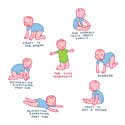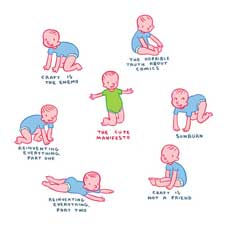
The Cute Manifesto
by James Kochalka
Alternative Comics

“For these reasons we choose cute. We deny the ugliness of the world around us and stand in opposition to it.” For some reason, try as I might, I can’t visualize a “Hang in There, Baby” poster or a collection of Ziggy dolls unironically adorning the walls and bookshelves of James Kochalka’s workspace. Not to suggest that the American Elf artist doesn’t have as much invested in cuteness as say, the guy who invented those god awful large-eyed Precious Moments children, it’s just that it seems necessary to note the fact that the author also has a good deal invested in awesomeness, the art of rocking, and, try as he might to deny it, craft, that nasty little ‘c’ word that he spends so much time and essays discounting. Were this not the case, we’d have never seen Monkey Vs. Robot. Nor would our senses have been graced by the enchanting siren melodies of the James Kochalka Superstar hits “Keg Party” or “President Kochalka.” Or for that matter, this book, whose page count would undoubtedly be quite a bit thinner, were all of the references to the importance of craft removed. Quick example: ‘In comics, melody and rhythm come together in the continuing transitions from panel to panel’.
That said, the central argument of the two opening essays, “Craft is the Enemy,” and its only slightly redundant sequel, “Craft is not a Friend,” remains strong, and quite important with regards to all of Kochalka’s output, both visually and aurally – great art comes from expressing yourself, rather than trying too hard, as an adolescence spent reading Rob Liefeld comics can more than attest. James Kochalka is nothing if not his own artist, a fact that has been consistently reinforced by his ever-increasing oeuvre.
“Reinventing Everything” (a two-parter) one ups Scott McCloud’s second book, beginning with a simplistic Kochalkian rendering of 9/11 (well, right after the vaguely upsetting image of a giant baby’s head emerging from Oscar Wilde’s torso), and, much like the title picto-essay, “The Cute Manifesto,” which it immediately precedes, it focuses on the emphasis of the good in life, and in that respect is typical Kochalka. Flowers and kittens, instead of tidal waves, planes crashing into buildings, or more to the point (subtext, friends), magic elves instead of gun-toting steroid-chugging superheroes.
“Sunburn” is rendered in a ‘realistic’ style (again with the craft!), a loosely autobiographic piece, exploring a freeform search for one’s place in the universe, by way of burned skin, cats, toilets and a quick romp through the cosmos. “The Horrible Truth About Comics,” from which that first paragraph ‘melody and rhythm’ quote was pulled, is the most craft-centric piece in the collection, in which the author’s Magic Boy alterego proclaims that, ‘the biggest insult is a comic that sucks.’ The moral of the piece seems to be that the most important part of comics is expressing yourself, just so long as your comic turns out well. Simple enough if you posses then natural skill and deceptively simple artistic approach of Mr. Kochalka, but as the author states in his own last-second amendment to the book, “Spelunking for Slippery Cave Fish,” ‘it turns out there are many truths, and some of them are contradictory.’ In other words, nothing that came before in the book should be accepted as gospel.
In the end, The Cute Manifesto makes a better Kochalka primer that it does an intellectually validating study in comic theory (read: Mr. McCloud again), collecting some of the author’s best non-plot driven short stories, comic essays whose theses are every bit as loose and malleable as Mr. Kochalka’s thick-brushed artwork, which turn out to be more of an exploration in the artistry of James Kochalka than in the comic medium, but as the author states time and again, art can often suffer from thinking too hard, and in that respect, The Cute Manifesto should serve as a far more useful tool than all of the intellectually elitist-approved texts on the subject. The Cute Manifesto is a good, fun read, which is perhaps the most important element of all, because when you take those qualities away from comics, you’re left staring at a blank page…
James Kochalka: http://www.indyworld.com/kochalka/












